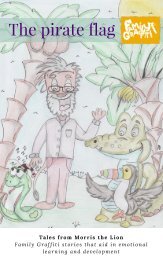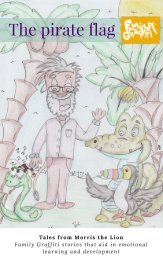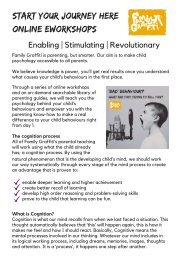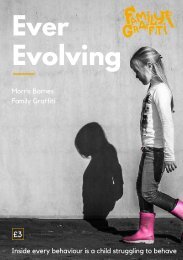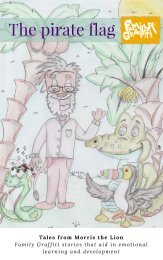Full Family G handout and Guide v2
Create successful ePaper yourself
Turn your PDF publications into a flip-book with our unique Google optimized e-Paper software.
Start your journey here<br />
online eworkshops<br />
Enabling | Stimulating | Revolutionary<br />
<strong>Family</strong> Graffiti is parenting, but smarter. Our aim is to make child<br />
psychology accessible to all parents.<br />
We believe knowledge is power, you’ll get real results once you underst<strong>and</strong><br />
what causes your child’s behaviours in the first place.<br />
Through a series of online workshops<br />
<strong>and</strong> an on-dem<strong>and</strong> searchable library of<br />
parenting guides, we will teach you the<br />
psychology behind your child’s<br />
behaviours <strong>and</strong> empower you with the<br />
parenting know-how to make a real<br />
difference to your child behaviours right<br />
from day 1.<br />
The cognition process<br />
All of <strong>Family</strong> Graffiti’s parental teaching<br />
will work using what the child already<br />
has; a cognition process. By using the<br />
natural phenomenon that is the developing child’s mind, we should work<br />
our way systematically through every stage of the mind process to create<br />
an advantage that is proven to:<br />
enable deeper learning <strong>and</strong> higher achievement<br />
create better recall of learning<br />
develop high order reasoning <strong>and</strong> problem-solving skills<br />
prove to the child that learning can be fun.<br />
What is Cognition?<br />
Cognition is what our mind recalls from when we last faced a situation. This<br />
thought automatically believes that ‘this’ will happen again, this is how it<br />
makes me feel <strong>and</strong> how I should react. Basically, Cognitive means the<br />
mental processes involved in our thinking. Whatever our mind includes in<br />
its logical working process, including dreams, memories, images, thoughts<br />
<strong>and</strong> attention. It is a ‘process’, it happens one step after another.
It's a powerful gift: Having the<br />
ability to think before you act.<br />
The cognitive process:<br />
Receive information (learning: hearing, seeing, touching, sensing, tasting)<br />
Retain information (stored, indexed to previous events <strong>and</strong> ready for recall)<br />
Recall information (how we think, when an event re-occurs)<br />
Reacting to this information (how we behave, because of this thinking)<br />
A practical definition of cognition would be the process by which we learn,<br />
think, feel & underst<strong>and</strong>. This process determines how we should react (behave)<br />
in a given situation.<br />
What is behaviour?<br />
Behaviour, therefore, is a reaction. We combine our thoughts <strong>and</strong> feelings<br />
about a current action or an upcoming event then we act on them. Adults can<br />
weigh up <strong>and</strong> consider the outcome or consequence of behaviour, but children<br />
have limited ability to do this.<br />
Cognitive Behaviour refers to everything that we do, <strong>and</strong> can be both ‘good’<br />
or ‘bad’ (although we prefer wanted or unwanted. This includes what we say,<br />
how we try to solve problems, how we react <strong>and</strong> also how we avoid certain<br />
situations. Behaviour refers to both action <strong>and</strong> inaction, when referring to a<br />
given situation. It is fashioned by our thinking process, rather than by an<br />
inherent need to be naughty or shy or unhappy.<br />
Weighing up the consequence <strong>and</strong> outcome of our behaviours is called<br />
cognitive reasoning, <strong>and</strong> this is a skill that children learn from watching <strong>and</strong><br />
interpreting the world around them (especially you – their parent).<br />
Morris xx
The cognitive process<br />
Receive<br />
Retain<br />
Recall<br />
The starting point for all learning<br />
7% verbal, 93% witnessed<br />
Processing ability / speed input<br />
Good messages in: ensure good messages out<br />
Message memory store<br />
Compartmentalised correctly or confused<br />
Cognitive dysfunction <strong>and</strong> cognitive thinkers<br />
Usually where cognition starts going wrong<br />
With associated feelings<br />
Our perception of what may happen: Anxiety<br />
How to achieve goals, influences compliance<br />
Processing ability / speed output<br />
Reactions to cognitive processing<br />
All behavioural responses are created within this mechanism of the<br />
cognitive process often to hide frustrations, confusions, anxieties or<br />
poor communicative skills etc.<br />
Poor cognitive reactions can usually be changed by refocusing this<br />
cognitive process by putting new messages in to replace the old.<br />
Autistic <strong>and</strong> concrete thinkers are usually geniuses with facts, precision<br />
<strong>and</strong> routine, but are hampered in-part by a disorientated linkage<br />
between each process stage <strong>and</strong> feelings are usually not influential in<br />
their reactions. Keep communication short <strong>and</strong> factual.
Planting new seeds <strong>and</strong> feeding cognition<br />
Cognition<br />
Feelings<br />
The cognitive process is a function created<br />
pre-birth.<br />
It receives, records <strong>and</strong> retains all incoming<br />
messages (information).<br />
It retains all information as 'factual'.<br />
It recalls these memories when accessed.<br />
It can develop as a 'fact' from a 'seed'<br />
planted during early years learning.<br />
It can be replanted with an<br />
alternative 'seed' of truth to<br />
refocus a new fact.<br />
Feelings are very powerful.<br />
Feelings develop later than cognition.<br />
Feelings are ever evolving / changeable.<br />
Expressed emotions can be misleading.<br />
Linking the 'true child needs' to the<br />
emotional display is 'key' to our parenting<br />
response <strong>and</strong> our cognitive empathy.<br />
Use what<br />
They have<br />
Behaviour<br />
All children are born with a functioning<br />
cognitive process <strong>and</strong> with auto recording.<br />
It is their natural born instinct to learn.<br />
Most of what they learn is via mimicking.<br />
The cognitive process can be disrupted or<br />
dysfunctional because of many factors.<br />
'Old' learning can be replaced with 'new'.<br />
Don't challenge... repair instead<br />
Reactions are a mix of our thought process<br />
<strong>and</strong> any associated feelings.<br />
It may not be true but it sure feels real.<br />
Reactions are what others usually see <strong>and</strong><br />
witness / recognise as 'behaviour'.<br />
All reactions are a 'learnt behaviour' <strong>and</strong><br />
can be 're-learnt' to have different<br />
outcomes <strong>and</strong> provide the child with coping<br />
skills.
E-workshops<br />
Easy to digest step-by-step guidance, for the modern parent.<br />
Cognition & Solution Focused Parenting eWorkshop<br />
Learn all about the cognition process; the psychology behind our parenting<br />
philosophy <strong>and</strong> get an introduction to solution-focused parenting <strong>and</strong> how it will<br />
lead to happier, calmer <strong>and</strong> simpler parenting.<br />
Behaviour eWorkshop<br />
Learn how to improve your child’s go-to behaviour reactions with our simple, step<br />
by step Behaviour Workshop course that will give you all the tools you need to<br />
practise our solution-focused parenting techniques.<br />
Communication eWorkshop<br />
Learn how to recruit the inner child with your words <strong>and</strong> actions – not only will<br />
we teach you how to speak so they will listen, you’ll also learn how to teach them<br />
to communicate, make friends <strong>and</strong> thrive.<br />
<strong>Family</strong> eWorkshop<br />
Life with more than one child can be a battleground at times! This workshop will<br />
empower you with parenting know-how to tackle sibling rivalry <strong>and</strong> balance<br />
sibling relationships.<br />
Divorce <strong>and</strong> separation: Dealing with change eWorkshop<br />
We strongly believe that a happy family is much more important to a child’s<br />
wellbeing than a nuclear family. Learn how to help both you <strong>and</strong> your child<br />
transition through family changes.<br />
Discipline <strong>and</strong> Boundaries eWorkshop<br />
Giving you all the tools you need to instil a solution-focused parenting approach.<br />
Boundaries <strong>and</strong> discipline needn’t be fraught with tension <strong>and</strong> raised voices, no<br />
longer will you have to go around in circles. This workshop is full to the brim with<br />
tips, solutions <strong>and</strong> guides to instilling successful boundaries <strong>and</strong> limitations<br />
without inhibiting your child’s learning.<br />
Sign up online now = £56 to access all areas<br />
www.familygraffiti.co.uk
E-workshops pt2<br />
Easy to digest step-by-step guidance, for the modern parent.<br />
Sleep eWorkshop<br />
In need of a good nights sleep? This workshop is packed full of how-to tips <strong>and</strong><br />
guides from bedtime routines to night terrors <strong>and</strong> anxious sleepers.<br />
Anxiety eWorkshop<br />
What is anxiety? What triggers anxiety? How to soothe your child’s anxiety?<br />
This workshop gives you all the parenting tools you need to cope with, manage<br />
<strong>and</strong> soothe your child’s anxious behaviours.<br />
Baby <strong>and</strong> Toddler eWorkshop<br />
How do babies learn? Should I discipline my toddler? Everything you need to<br />
know about child psychology in the early years <strong>and</strong> helping your toddler to<br />
underst<strong>and</strong> their world, through their eyes.<br />
Food Phobia eWorkshop<br />
Why are kids picky eaters <strong>and</strong> how can we help them to have a better<br />
relationship with their food psychologically? This workshop will teach you<br />
everything you need to know about our psychological relationships with food.<br />
School eWorkshop<br />
Covering everything from how to help prepare your child for their first day at<br />
school, helping them to embrace <strong>and</strong> enjoy learning to making friends <strong>and</strong><br />
coping with bullying. This workshop will empower you to help your child through<br />
their school years.<br />
Autism eWorkshop<br />
From daily routines, to communicating with a concrete thinker. Our Autism<br />
workshop will give you the tools you need to help you to underst<strong>and</strong> how a child<br />
with Autism underst<strong>and</strong>, learns, thinks <strong>and</strong> engages with their world.<br />
Sign up online now = £56 to access all areas<br />
www.familygraffiti.co.uk
Plus, Our ever growing library<br />
of self-help papers, written to<br />
suit all of your needs.<br />
Managing Anxiety<br />
Beating the ‘bully’ in your child’s mind – reducing anxieties<br />
Dealing with change<br />
Dealing with a new baby in the house<br />
“Help my child to make friends”<br />
How to overcome food phobias<br />
“My child is too scared to sleep” – case study<br />
Picky Eaters<br />
Preparing your child to join with others<br />
Sleep Easy – anxious child<br />
What is Anxiety?<br />
What to do (<strong>and</strong> not to do) when children are anxious<br />
Changing a child’s behaviour<br />
Ask what, not why! When you want to know<br />
“Behave … Me?” what to do when a child misbehaves<br />
out of the house<br />
Calm voices, Calm choices, Calm children (no yelling)<br />
Countering Conflict – tips on how to avoid confrontation<br />
Discipline – correctly defined<br />
8 steps to improve a child’s behaviour<br />
How do I discipline my toddler?<br />
How do I teach my child to manage their own behaviour?<br />
How do I teach my child to respect me?<br />
How to recruit the inner child to engage <strong>and</strong> reinforce new<br />
outcomes<br />
How to repair sibling relationships<br />
“It’s not fair” ~ my child always screams it’s not fair<br />
Managing tantrum meltdowns better<br />
My child is a bully, how do I stop this?<br />
“Naughty Steps” <strong>and</strong> other do nots<br />
“Ouch, that hurts” ~ is it okay to spank my child?<br />
“Okay, that didn’t hurt” alternative discipline teaches good<br />
reactions<br />
Promoting emotional wellbeing, don’t fight it, work with it<br />
Punishment totally dismissed – it teaches NO new behaviours<br />
“Sorry” is just a worthless word<br />
Spanking isn’t a punishment, it’s an abuse, <strong>and</strong> it doesn’t<br />
correct anything<br />
10 things to try that show why calmer is better<br />
What are we teaching our children – giving effective<br />
instruction<br />
“Why is my child naughty?” ~ Underst<strong>and</strong>ing your child’s<br />
behaviour<br />
“What is cognition?” – Cognition defined<br />
X-box <strong>and</strong> all that stuff<br />
X-box <strong>and</strong> older siblings<br />
You don’t have to say NO!<br />
PACE: how to avoid tantrums <strong>and</strong> meltdowns?<br />
Dad’s need help too<br />
How Dads can master bedtime routines<br />
Weekend Dad, some practical solutions<br />
Weekend Dad, your child’s emotions – coping with change<br />
Will I be like my Dad? ~ fears from the past<br />
Working with a Diagnosed difficulty<br />
Autism – daily routines<br />
Autism – I am a concrete thinker, communication with me<br />
is different<br />
Autism – phrasing your words<br />
Autism – underst<strong>and</strong>ing how a child with autism learns<br />
Autism – what is autism spectrum?<br />
Autism – what is neurodevelopmental disorder?<br />
What is PDA?<br />
How to help a child who is self-harming<br />
Learning stages Different ages, different learning<br />
Actions speak louder than words<br />
Baby Knows best 1 (0-2 years)<br />
Baby knows best 2 (0-12 months)<br />
Dealing with a new baby in the house<br />
4 tips on communication when talking to children<br />
Life Modelling – how we teach our children<br />
Toddlers know better 1 (2-3 years)<br />
Toddlers know better 2 (2-3 years)<br />
Pre-schoolers know it all (3-5 years)<br />
Use what they have, to give them more (3-5 years)<br />
When should I teach my child boundaries – toddlers<br />
School <strong>and</strong> education: needs <strong>and</strong> coping strategies<br />
How to retain reading skills ~ helping a child revise<br />
Motivating your child to focus on school work<br />
What is SEN? And how it relates to a child’s education<br />
Learning Solution focused parenting skills<br />
Actions speak louder than words<br />
Birth Order: siblings (a pack of three)<br />
Boundaries, praise <strong>and</strong> reflection time<br />
Calm voices, Calm choices, Calm children<br />
Changing behaviour by re-framing the reaction<br />
Children <strong>and</strong> their feelings – the perfect cognitive repair?<br />
Cognitive <strong>and</strong> Constructivist parenting<br />
Cognitive difficulties <strong>and</strong> influencers – affect your child’s<br />
learning ability<br />
Communicating better underst<strong>and</strong>ing – “why ask why?”<br />
Countering Conflict – tips on how to avoid confrontation<br />
Talking of children – do you underst<strong>and</strong> child psychology?<br />
“Finding Diamonds on the Beach” ~ making everyday events<br />
useful<br />
Helping toddlers to underst<strong>and</strong> boundaries<br />
How children learn – wired to absorb, process <strong>and</strong> learn<br />
everything<br />
How to recruit the inner child to engage <strong>and</strong> reinforce new<br />
outcomes<br />
How your child will learn new behaviour skills<br />
Life Modelling – how do I get my child to do as their told?<br />
Organising a successful day out (<strong>and</strong> still be smiling at the end of<br />
it)<br />
Parenting that is future proof – enabling, stimulating <strong>and</strong><br />
revolutionary<br />
Problem solving to build a child’s self-esteem<br />
Problem solving: it isn’t about you doing it<br />
Promoting emotional wellbeing, don’t fight it, work with it<br />
Repairing sibling relationships (stopping fighting <strong>and</strong> falling out)<br />
Step-by-step problem solving<br />
Teaching: Praise, Blame <strong>and</strong> reward<br />
Underst<strong>and</strong>ing <strong>and</strong> recognising your child’s behaviours
Our services<br />
Our FREE weekly Parent <strong>Guide</strong>s<br />
Regular posts <strong>and</strong> newsletters direct to your inbox. Providing topical “toolbox” tips, <strong>Family</strong> Graffiti news,<br />
views <strong>and</strong> updates of all of developing our services.<br />
Be sure that you are first to know about our latest information <strong>and</strong> content. Simply provide your email<br />
address, then be sure to “like <strong>and</strong> share” our messages with your friends <strong>and</strong> family.<br />
Every month we have a different parenting focus - communication, anxiety, discipline <strong>and</strong> boundaries... <strong>and</strong><br />
many more!<br />
1-2-1 Cognitive <strong>Family</strong> Therapy Parent Talk<br />
Specific to your family <strong>and</strong> parenting needs.<br />
£45 per 60 minute session in person<br />
£30 per digital email response.<br />
Testimonial: “Morris & Gemma are amazing <strong>and</strong><br />
have pointed me in a direction where I can actually<br />
see the end of the tunnel after the first 1-2-1<br />
meeting. Thank you so much, keep up the amazing<br />
work”<br />
News <strong>and</strong> views from parents <strong>and</strong> <strong>Family</strong> Graffiti<br />
Members. Please contact us if you'd like to<br />
contribute to Parent Talk.<br />
Testimonial: “Fascinating stuff! I really learnt a<br />
lot, after 6 years of hearing the same advice,<br />
a breath of fresh air! Great to have a team so<br />
passionate about what they do!”<br />
.<br />
Parent online E-Workshops<br />
Testimonial: “It’s opened my eyes to finding alternatives” … “Incredibly helpful”<br />
We highly recommend that you follow up these workshops by joining our online parenting<br />
platform for modern parents, with a library of parenting guides <strong>and</strong> eWorkshops. You will<br />
receive more in depth knowledge of our practices <strong>and</strong> how they can benefit you <strong>and</strong><br />
your children. Smarter parenting for just £56.00 per year <strong>and</strong> all subjects covered.<br />
Testimonial: “I love the papers in your library … just reading a h<strong>and</strong>ful is already<br />
transforming my parenting, <strong>and</strong> I feel much calmer about dealing with some<br />
tantrums <strong>and</strong> huge expressions of emotion”<br />
www.familygraffiti.co.uk





